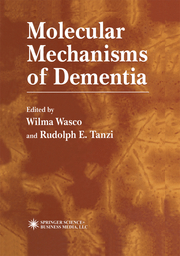Detailansicht
Molecular Mechanisms of Dementia
Contemporary Neuroscience
ISBN/EAN: 9781475758894
Umbreit-Nr.: 5657563
Sprache:
Englisch
Umfang: xi, 312 S., 33 s/w Illustr., 2 farbige Illustr., 3
Format in cm:
Einband:
kartoniertes Buch
Erschienen am 21.03.2013
Auflage: 1/1997
- Zusatztext
- The past decade has witnessed a revolution in the attempts of scientists to under stand the molecular basis of dementia. Although dementia, as defined by global cogni tive decline involving gradual loss of memory, reasoning, judgment, and orientation, presents most commonly in the form of Alzheimer's disease (AD), an assortment of other less common disorders, such as prion and Pick's disease, can also lead to symp toms that are similar to those observed in patients with AD. The primary goal of Molecular Mechanisms of Dementia is to address the various mechanisms and multi faceted approaches currently being employed to more clearly delineate the etiological and pathogenic events responsible for the onset of dementia. Perhaps the greatest boon to obtaining a clearer understanding of the causes of AD has come from genetic and molecular biological studies carried out over the past decade. At the genetic level, it has become increasingly clear that AD is a heteroge neous disorder that can be broadly classified into two categories. "Late onset" (>60 yr) cases, which account for the vast majority of AD, genetically involve "susceptibility" genes representing risk factors for the disease (e. g., inheritance of the 84 allele of the Apolipoprotein E gene). In many cases, the susceptibility gene can act as a "modifier" that modulates the pathogenic cascade occurring subsequent to a separate etiological event "initiating" or "causing" the disorder.
- Kurztext
- Wilma Wasco and Rudolph Tanzi bring together in Molecular Mechanisms of Dementia the best and latest thinking by leading scientists on the etiologic and pathogenic events responsible for the onset of Alzheimer's disease and related dementias. In presenting the various mechanisms and multifaceted approaches currently being employed, the distinguished contributors review such critical factors as apoptosis, energy metabolism, excitotoxicity and calcium-mediated cell death, free radicals, electrophysiological abnormalities, environmental toxins, degeneration of neural networks, and modification of the cytoskeleton. They also examine mechanisms by which ischemia and hypoxia result in dementia. Molecular Mechanisms of Dementia is the first major contemporary review of this dramatically advancing field. It provides an invaluable summary of the tremendous progress that has been made in developing testable models of the molecular mechanisms of dementia, as well as critical insights into the necessary direction of future investigations of dementia. The book is certain to become a standard reference for all researchers now working in the field of neurodegenerative disorders.
- Autorenportrait
- InhaltsangabeEtiological Clues from Gene Defects Causing Early Onset Familial Alzheimer's Disease, Wilma Wasco and Rudolph E. Tanzi. Potential Biological Mechanisms of ApoE in Alzheimer's Disease, G.William Rebeck. Understanding the Biology and Molecular Pathogensis of Alzheimer's Disease in Transgenic Mice Expressing Amyloid Precursor Proteins, Karen K. Hsiao. Mechanism for b-Amyloid Overproduction in Alzheimer Disease: Possible Antisense RNA-Mediated Generation of a 5'-Truncated bAPP mRNA Encoding 12-kDa C-Terminal Fragment of bAPP, the Immediate Precursor of Ab, Vladimir Volloch. Apoptosis and Alzheimer's Disease, Andréa LeBlanc. The b-Amyloid Model of Alzheimer's Disease: Conformation Change, Receptor Cross-Linking, and the Initiation of Apoptosis, Carl W. Cotman, David H. Cribbs, and Aileen J. Anderson. Energy/Glucose Metabolism in Neurodegenerative Diseases, John P. Blass. Calcium Homeostasis and Free Radical Metabolism as Convergence Points in the Pathophysiology of Dementia, Mark P. Mattson, Katsutoshi Furukawa, Annadora J. Bruce, Robert J. Mark, and Emmanuelle Blanc. b-Amyloid-Derived Free Radical Oxidation: A Fundamental Process in Alzheimer's Disease, D. Allan Butterfield, Kenneth Hensley, Nathan Hall, Ramachandran Subramaniam, Beverly J. Howard, Pamela Cole, Servet Yatin, Michael LaFontaine, Marni E. Harris, Marina Aksenova, Michael Aksenov, and John M. Carney. Inflammatory Pathways: Implications in Alzheimer's Disease. Inflammatory Mediators in Alzheimer's Disease. t Protein and the Neurofibrillary Pathology of Alzheimer's Disease, Michel Goedert, John Q. Trojanowski, and Virginia M.-Y. Lee. Anatomy of Pathological Alterations in Alzheimer's Disease, Bradley T. Hyman. Cerebral Zinc Metabolism in Alzheimer's Disease, Craig S. Atwood, Robert D. Moir, Xudong Huang, Rudolph E. Tanzi, and Ashley I. Bush. Potassium Channels and Calcium Release: Pathophysiological and Diagnostic Implications for Alzheimer's Disease, René Etcheberrigaray and Daniel L. Alkon. PickDisease, Jean-Paul G. Vonsattel, Giuliano Binetti, and Lynne M. Kelley. Ischemia, Raymond T. F. Cheung and Vladimir Hachinski. Prion Diseases and Dementia, Piero Parchi and Pierluigi Gambetti. Index.
